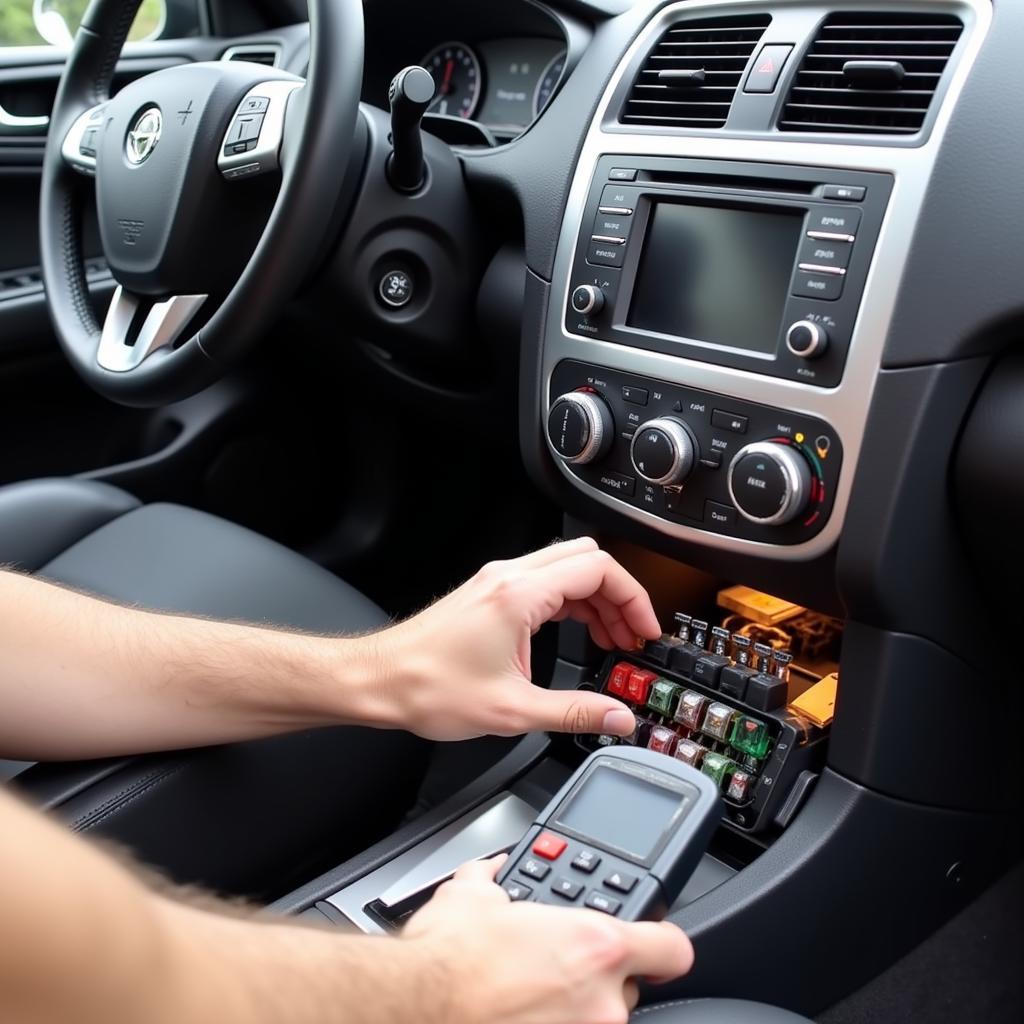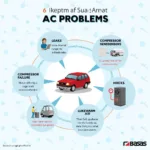Car radio diagnostics is crucial for identifying and resolving issues within your vehicle’s entertainment system. From a simple static buzz to a complete system failure, diagnosing the problem accurately saves time and money. This guide dives deep into the world of car radio diagnostics, covering everything from basic troubleshooting to advanced techniques.
Understanding the Importance of Car Radio Diagnostics
Modern vehicles heavily rely on integrated electronics, and the car radio is no exception. A malfunctioning radio can be more than just an inconvenience; it can be a symptom of a larger electrical issue. Accurate car radio diagnostics allows you to pinpoint the root cause, preventing further damage and costly repairs down the line. Whether you’re dealing with a faulty antenna, a blown fuse, or a software glitch, a systematic diagnostic approach is key.
Common Car Radio Problems and Their Causes
Car radios, like any electronic device, are prone to various problems. Here are some common issues and their potential causes:
- No Power: This could be due to a blown fuse, a wiring problem, or a faulty head unit.
- Poor Reception: A damaged or disconnected antenna, interference from other electronic devices, or a weak radio signal can all contribute to poor reception.
- Sound Distortion: Damaged speakers, a faulty amplifier, or incorrect audio settings are common culprits for distorted sound.
- Erratic Operation: Software glitches, loose connections, or a failing head unit can cause erratic behavior like random shutdowns or unresponsive controls.
- CD/USB/Bluetooth Issues: Problems with these features could stem from a malfunctioning drive, incompatible devices, or software issues.
DIY Car Radio Diagnostics: Where to Start
Before rushing to a mechanic, there are several diagnostic steps you can take yourself.
- Check the Fuse Box: Locate the fuse corresponding to the car radio in your vehicle’s owner’s manual and check if it’s blown. Replace it if necessary.
- Inspect the Antenna: Ensure the antenna is securely connected and free from damage.
- Check the Wiring: Visually inspect the wiring connections at the back of the radio for any loose or damaged wires.
- Test with Another Radio: If possible, try connecting a known working car radio to your vehicle to see if the problem persists. This can help isolate whether the issue lies with the radio itself or the vehicle’s electrical system.
Advanced Car Radio Diagnostics: Tools and Techniques
For more complex issues, advanced diagnostic tools and techniques are necessary.
- Multimeter: This device measures voltage, current, and resistance, helping identify electrical faults in the radio’s circuitry.
- Oscilloscope: An oscilloscope visualizes electrical signals, allowing technicians to analyze the radio’s waveforms and diagnose complex problems.
- Diagnostic Software: Many modern car radios have built-in diagnostic capabilities that can be accessed using specialized software. This software can provide detailed information about the radio’s status and identify specific faults.
“Using a multimeter is a fundamental step in car radio diagnostics,” says Michael Stevens, a seasoned automotive electrician with over 20 years of experience. “It helps you quickly pinpoint issues within the radio’s electrical system.”
When to Seek Professional Help
While some car radio problems can be resolved with DIY methods, others require professional expertise. If your initial troubleshooting steps don’t resolve the issue, or if you’re uncomfortable working with electrical systems, it’s best to consult a qualified car audio technician. They have the necessary tools and knowledge to diagnose and repair even the most complex car radio problems.
“Don’t underestimate the complexity of modern car radios,” advises Sarah Chen, a certified car audio technician. “If you’re unsure, seeking professional help can save you time and potentially prevent further damage.”
Conclusion: Keeping Your Car Radio in Tune
Car radio diagnostics is essential for maintaining a properly functioning entertainment system in your vehicle. From simple checks to advanced techniques, understanding the process can save you time and money. Remember, a systematic approach to car radio diagnostics is key to identifying and resolving issues effectively, ensuring your drive is always accompanied by your favorite tunes.
FAQ
-
What is the most common cause of car radio problems? Blown fuses and loose connections are among the most frequent culprits.
-
Can I diagnose car radio problems myself? Yes, basic troubleshooting steps like checking fuses and connections can often be done at home.
-
When should I take my car to a professional for car radio repair? If basic troubleshooting doesn’t resolve the issue or if the problem seems complex, it’s best to consult a professional.
-
What tools are used for advanced car radio diagnostics? Multimeters, oscilloscopes, and specialized diagnostic software are commonly used.
-
How can I prevent car radio problems? Regular maintenance, such as checking connections and fuses, can help prevent issues.
-
What is the cost of car radio repair? The cost can vary depending on the problem and the make and model of your vehicle.
-
Where can I find a qualified car audio technician? Online directories and local automotive repair shops are good places to start.
Need help with car radio diagnostics? Contact us via WhatsApp: +1(641)206-8880, or Email: [email protected]. Our team is available 24/7 to assist you.



